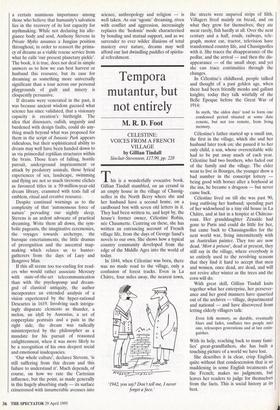Tempora mutantur, but not entirely
M. R. D. Foot
CELESTINE: VOICES FROM A FRENCH VILLAGE by Gillian Tindall Sinclair-Stevenson, £17.99, pp. 228 This is a wonderfully evocative book. Gillian Tindall stumbled, on an errand in an empty house in the village of Chassig- nolles in the North Berry where she and her husband have a second home, on a cardboard box with seven old letters in it. They had been written to, and kept by, the house's former owner, Celestine Robin, nee Chaumette. Centring on these, she has written an entrancing account of French village life, from the days of George Sand's novels to our own. She shows how a typical country community developed from the edge of the Middle Ages into the world of today.
In 1844, when Celestine was born, there was no made road to the village, only a confusion of forest tracks. Even in La Chatre, four miles away, the nearest town, `1942, you say? Don't tell me, I never forget a face.' the streets were unpaved strips of filth. Villagers lived mainly on bread, and on what they grew for themselves; they ate meat rarely, fish hardly at all. Over the next century and a half, roads, railways, tele- graph, motor car, tractor, television have transformed country life, and Chassignolles with it. She traces the disappearance of the pedlar, and the arrival — and then the dis- appearance — of the small shop; and yet she can trace continuities through the changes.
In Celestine's childhood, people talked and thought of a past golden age, when there had been friendly monks and gallant knights; today they talk wistfully of the Belle Epoque before the Great War of 1914:
In myth, 'the olden days' tend to form one condensed period situated at some date remote, but not too remote, from living memory.
Celestine's father started up a small inn, the first in the village, which she and her husband later took on; she passed it to her only child, a son, whose overexcitable wife had to be put away much of each year. Celestine had two brothers, who faded out of the family and the village. The elder went to live in Bourges, the younger drew a bad number in the conscript lottery being good with horses after a boyhood at the inn, he became a dragoon — but never came back.
Celestine lived on till she was past 90, long outliving her husband; spending part of her widowhood in a tiny old house in La Chatre, and at last in a hospice at Château- roux. Her granddaughter Zenede had gone to Paris and could do little for her, but came back to Chassingnolles for the next world war, living intermittently with an Australian painter. They too are now dead. 'Mort a present', dead at present, they still say in the village, where everybody is so entirely used to the revolving seasons that they find it hard to accept that men and women, once dead, are dead, and will not revive after winter as the trees and the corn will do.
With great skill, Gillian Tindall knits together what her enterprise, her persever- ance and her good manners have quarried out of the archives — village, departmental and national — and have discovered from letting elderly villagers talk:
Even folk memory, so durable, eventually blurs and fades, conflates two people into one, telescopes generations and at last extin- guishes.
With its help, reaching back to many fami- lies' great-grandfathers, she has built a touching picture of a world we have lost.
She describes it in clear, crisp English, quite without that condescension that is so maddening in some English treatments of the French; makes no judgments, but leaves her readers to judge for themselves from the facts. This is social history at its best.


























































 Previous page
Previous page